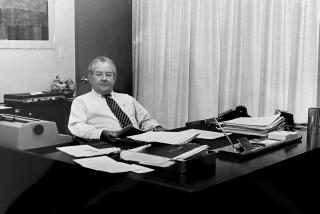Oscar Hijuelos: An appreciation
Oscar Hijuelos, the Pulitzer Prize-winning novelist who died Saturday, was a cultural pioneer who wrote elegant novels about ambitious Cuban expatriates and music-loving New Yorkers. He told stories that revealed the texture and passion of the Latino immigrant experience to legions of non-Latino readers for the first time.
The son of Cuban immigrants, Hijuelos was born and raised in the upper half of Manhattan, in one of those wonderfully integrated, working-class neighborhoods the United States produced in the middle of the last century. His friends in the West Harlem neighborhood of Morningside Heights were German, Irish, black and Latino.
When Hijuelos started writing, taking creative writing classes at the City College of New York (where Donald Barthelme, the short-story writer, was one of his teachers), the dream of writing a book seemed remote indeed.
â[I]t was a very rare thing to see published work by any members of that primitive tribe from our urban jungles known as los Latinos,â Hijuelos wrote in his 2011 memoir, âThoughts Without Cigarettes.â âI thought it would be years before I could write anything worthwhile. Even then, who out there would publish it?â
He sold his first novel, âOur House in the Last World,â to a small publisher, making an entire book out of his fleeting memories of the island and his much richer memories of a New York childhood. His characters were funny, angry and expressed emotions that were all too familiar to his Latino readers but exotic to many of his non-Latino readers.
Hijuelos found a way to cross Manhattan and its cultural divide (one mirrored in the rest of the United States) and eventually reached hallowed ground in the southern half of the island on Union Square West: the offices of one of the most respected houses in American publishing, Farrar, Straus & Giroux.
FSG published Hijuelosâ second novel, âThe Mambo Kings Play Songs of Love,â which won the 1990 Pulitzer Prize for Fiction. That success helped open the door of New York publishing to the wide variety of Latino writers who have followed in his footsteps, from other Cuban Americans, such as Cristina Garcia, Dominican writers including Julia Alvarez and Junot Diaz, and Mexican Americans such as Dagoberto Gilb and Sandra Cisneros.
âMambo Kingsâ was Hijuelosâ undisputed masterpiece, a three-decade epic about a Cuban familyâs adventures in New York. And it opened with a subtle but highly effective act of cultural subversion.
Ricky Ricardo, the Cuban bandleader husband on âI Love Lucy,â was for many decades the most recognizable Latino face on U.S. television. Hijuelos took his novelâs protagonists â two Cuban musicians he based largely on an uncle whoâd played briefly with Xavier Cugat in the 1950s â and gave them a fictional cameo on that famous television show.
The Castillo brothers are musicians. And in the imagined episode, they are playing the role of two of Rickyâs friends, just arrived from Cuba, âtwo men in white silk suits and butterfly-looking lace bow ties, black instrument cases by their side and black-brimmed white hats in their handsâŚâ
âManny, Alfonso!â Ricky Ricardo says. âGee, itâs really swell that you fellas could make it up here from Havana for the show.â
In that moment, Hijuelos uses the exceedingly familiar â âI Love Lucyâ ran for decades on U.S. television in reruns â to introduce his readers to something unfamiliar and seemingly exotic: the interior life, and tortured personal history, of two Cuban American immigrants.
The Castillo brothers are complex characters, at turns charming and seductive, then melancholy and moody. Hijuelos follows them from the 1950s and the age when mambo music was all the rage, to the loneliness of the 1980s, when the surviving brother is a lonely and defeated man.
Hijuelos went on to write a half-dozen more novels. None of his books had nearly the success of âMambo Kings,â though his 2011 memoir, which traces his journey from West Harlem to Union Square and many places beyond, was excellent. In my review in The Times, I called that book âa wonderfully intimate epic and an essential document of the evolution of American literature.â
ALSO:
Alice Munroâs quiet, precise works lead to Nobel Prize in literature
Malala doesnât win Nobel Peace Prize -- and the Taliban celebrates
More to Read
Sign up for our Book Club newsletter
Get the latest news, events and more from the Los Angeles Times Book Club, and help us get L.A. reading and talking.
You may occasionally receive promotional content from the Los Angeles Times.








